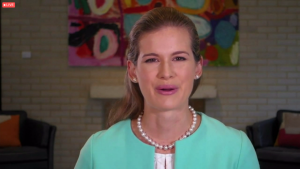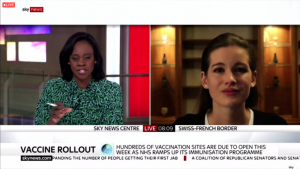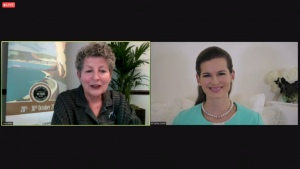 ‘Gender stereotypes and the new era of globalised healthcare’
‘Gender stereotypes and the new era of globalised healthcare’
Blog by Jane Slatter, SI St Albans and District
Carina was introduced and welcomed by Jane Webb from SI Canterbury.
I will start by apologising about the length of this blog – Carina delivered so much valuable information that I don’t want to miss out anything important!
Carina was speaking to us from her workplace – Murray Edwards College, University of Cambridge where she has been working on Corona viruses since 2019 – before the pandemic! Hers is quite a journey to tell us about, from medical student and model to the vital work she has been doing during the global COVID-19 pandemic.
Carina was introduced to what she described as her purpose in life of “health and wellbeing for all” by her parents’ work in Switzerland – her mother in healthcare and her father as a particle physicist working on the Cern Hadron Collider. She studied medicine at Murray Edwards College, Cambridge – a women only college, where she felt fortunate to be surrounded by exceptional women mentors and role models. In 2014 she had a year out from her degree having been crowned “Miss World” and now the charity ambassador for the Miss World charity foundation in aid of disadvantaged children. This enabled her to travel to support the charity’s projects. Before then Carina had travelled in order to research viruses on a voluntary basis. One example she gave us was visiting an Amazon island where syphilis was prevalent with pregnant women and causing babies to die. It turned out that they had a belief that babies would be stronger if the women had sperm from multiple males. They were able to administer penicillin and babies survived. During her travels she saw first-hand the appalling impact of SARS, Ebola and the Zika virus. It was these experiences that led to her field of expertise in respiratory diseases and her interest in addressing the disparity in healthcare and health outcomes dependent on where you live in the world. When Carina qualified and while she was working as a junior doctor on the frontline in Oxford University Hospital she began her work of researching respiratory diseases – much of which went into the 2020 research papers on Coronavirus – the disease that has caused 5 million deaths, including a member of her own family. Only 2.6 million people have been fully vaccinated against COVID-19 out of a global population of 7.8 billion people. Carina said “we cannot eradicate COVID-19 until all nations have been able to eradicate it” – health is global not national.
Carina made some important points about the need for researchers to share information globally. International agreements are needed so that the benefits from genetic information can be shared. The Nagoya and Pitt protocols have been vital to the speed at which the COVID-19 vaccines were able to be developed – cutting times down from 5 years to less than 1 year. Sharing is efficient – it cuts trial times and prevents duplication of effort. There has been increased collaboration during the pandemic and there needs to be systems in place to support it. Researches need to be incentivised to share information that will benefit the world so that they are rewarded for their work.
 Carina showed us 3 videos where she was being interviewed on TV. In two she providing expert advice on the Coronavirus during the COVID-19 pandemic – in one Piers Morgan appeared surprised that a Miss World winner would be doing the work that Carina is doing…. In the third interview she was campaigning during the junior doctors’ pay dispute in the UK – because of the pressure the NHS was under at the peak of COVID-19 hospitalisations in 2020. She had been working with the World Health Organisation on how to prepare and manage pandemics. Why was the world so ill-prepared? Global health security is underfunded because it is hard to advise countries to invest in something they might never need.
Carina showed us 3 videos where she was being interviewed on TV. In two she providing expert advice on the Coronavirus during the COVID-19 pandemic – in one Piers Morgan appeared surprised that a Miss World winner would be doing the work that Carina is doing…. In the third interview she was campaigning during the junior doctors’ pay dispute in the UK – because of the pressure the NHS was under at the peak of COVID-19 hospitalisations in 2020. She had been working with the World Health Organisation on how to prepare and manage pandemics. Why was the world so ill-prepared? Global health security is underfunded because it is hard to advise countries to invest in something they might never need.
Carina spoke about the importance of having good data to produce resourcing models. If you have unexpected demand, like with COVID-19 the systems cannot cope. The UK is lucky having good data from the NHS and was thus able to respond (relatively) quickly. Many countries’ resources are not allocated well because they don’t have the data to make decisions on.
Carina is optimistic about the future of digital care. The pandemic has led to the adoption of more apps that can improve people’s health outcomes than ever before. She is now working with a venture capital company that is investing in digital health systems – with personalised care being delivered to the point of care. She is also working with the Francis Crick institute, is a Governor of Cambridge Hospital and is working with Sir Greg Winter, Nobel Prize winner.
This is one extremely busy, clever and inspirational woman – she is a feminist and passionate about encouraging more women and girls into STEM. She believes it is the role of the leader to create other leaders and that she has been fortunate in having so many great female role models. She ended with “we need more women scientists, policy makers and world leaders!”
 Q&A There were lots of questions about COVID-19. One question was about the distribution of excess vaccines. Carina says every country needs rapid distribution systems so that excess vaccines can be shared, however the cold storage temperatures for the Moderna and Pfizer vaccines is a serious problem. Vaccine hesitancy? All comes down to education – we need scientists to explain things properly – Messenger RNA breaks down in the body and therefore can’t interact with the body later.
Q&A There were lots of questions about COVID-19. One question was about the distribution of excess vaccines. Carina says every country needs rapid distribution systems so that excess vaccines can be shared, however the cold storage temperatures for the Moderna and Pfizer vaccines is a serious problem. Vaccine hesitancy? All comes down to education – we need scientists to explain things properly – Messenger RNA breaks down in the body and therefore can’t interact with the body later.
Carina was asked if she has suffered abuse as a woman – she said not personally but it needs it be challenged and solutions found so that women can feel safe and confident. Social media policies urgently need to be addressed.
She was asked about future research and is excited about the great progress in retroviral treatments. The pandemic has shown how innovation can benefit healthcare systems globally.
Summation After Carina’s engaging and inspirational talk Jane Webb summarised that the main takeaway from it for her was that international collaboration is absolutely vital.
About the speaker:
Dr Carina Tyrrell is a British-Swiss public health physician and a research scientist fellow at Cambridge University.
Carina recently featured on the front page of The Times – talking about her work leading on COVID-19 antibody detection, COVID-19 management in intensive care, and identifying COVID-19 vaccine and therapeutic trials with Oxford University.
She has worked with local and national government and international organisations including the World Health Organization, where she authored international policy documents and published work on emerging respiratory viruses. As advisor to healthcare-focused venture capital firms and an ex-founder, Carina’s work is driving the translation of technology into healthcare systems and the use of digital health technologies.
Carina graduated from Cambridge University with a First Class Degree in Medicine and a Master of Public Health with Distinction.
She has appeared on BBC News, ITV News, Sky News, Radio 4, and has been featured in The Times, Daily Telegraph, and Business Insider.

